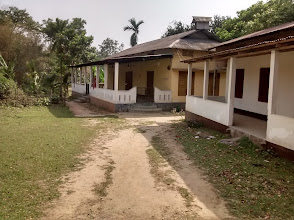
Chalantapara Masjid, nestled in the village of Chalantapara in Dhubri district, Assam, is a symbol of the region's Islamic heritage. The mosque holds significant cultural and spiritual value, providing a place for the local Muslim community to come together for worship, celebrations, and social activities. It serves as a center for religious education and the observance of important Islamic traditions. The mosque is especially lively during major Islamic festivals such as Eid, when the community gathers in large numbers to perform special prayers and celebrate together. Dhubri, where the mosque is located, has a rich history intertwined with the Brahmaputra River. The district is historically significant, having been influenced by the Koch and Mughal dynasties. The area around the mosque is characterized by its rural charm and is surrounded by patches of forest and small hillocks, adding to the tranquil setting. The Brahmaputra River, which flows through the district, has a profound impact on the local culture and economy, shaping the lives of the people who reside here. While the mosque itself may not be widely known beyond the local region, it plays a vital role in the spiritual life of Chalantapara’s inhabitants. The architecture of the mosque may not be grand compared to some of the more famous mosques in India, but it embodies the essence of simplicity and devotion. It is a functional space that serves the daily needs of worshippers, fostering a sense of unity and shared faith among the local Muslim population. The history of the mosque is closely linked with the region's Islamic traditions, which have been preserved over centuries. Dhubri district is home to various other historical and religious sites, including other mosques and temples that showcase the area’s multicultural character. As part of the broader historical landscape of Dhubri, Chalantapara Masjid contributes to the district's identity as a place where diverse cultures and traditions converge. Chalantapara is a small, rural area, which means that the mosque's upkeep is primarily managed by the local community, reflecting their commitment to maintaining their religious and cultural heritage. The mosque’s location away from the hustle and bustle of city life provides a peaceful environment for worshippers and visitors alike, making it a place of spiritual solace.